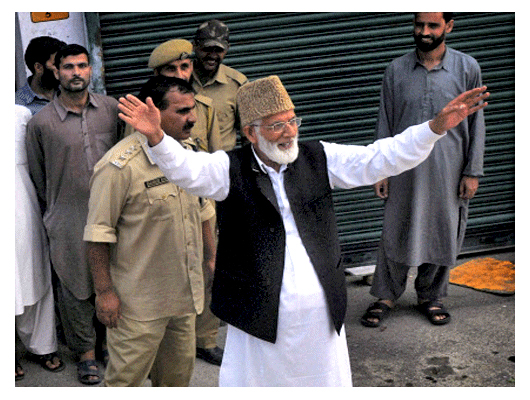Srinagar, Aug 20: Top Kashmiri separatist leaders, including Syed Ali Shah Geelani and Mirwaiz Umer Farooq, were today put under house arrest only to be released within hours in actions that were linked to their proposed meeting with Pakistani National Security Advisor Sartaj Aziz in Delhi on Sunday.
Early this morning, police put restrictions on the movement of the several separatist leaders including moderate Hurriyat Chief Mirwaiz Umar Farooq, Maulana Mohammad Abbas Ansari, Mohammad Ashraf Sehrai, Shabir Ahmad Shah and Ayaz Akbar.
Security personnel were deployed outside the Hydrepora residence of Geelani, the hardline Hurriyat chief who is already under house arrest. JKLF Chairman Mohammad Yasin Malik was taken into preventive custody from his Maisuma residence and lodged at police station Kothibagh.
Officials were tightlipped on the reason for the detention but there was speculation that it could have been done to give a message to Pakistan that its engagement with separatists leaders was not welcome, especially at a time when their National Security Advisors are to meet.
But, in a U-turn the authorities lifted the curbs on the leaders, again without giving any reason. "All the separatist leaders, who were detained or put under house arrest this morning, have been released," a top police official said on the condition of anonymity.
However, Akbar, who is spokesman of the hardline faction of Hurriyat, said while other leaders were released, Geelani was still under house arrest.
"We are unable to make out the purpose behind putting the leadership under house arrest and then releasing them within two hours. All we can say that it is unfortunate," Akbar told PTI soon after his release.
Police conducted early morning raids to detain the second rung separatist leaders also but they too were halted.
Pakistan High Commission in Delhi has invited Geelani for a meeting on August 24 with Aziz, who will be in the national capital for talks with Indian NSA Ajit Doval.
Moderate separatist leaders have also been invited for a reception being hosted by the High Commission in New Delhi for the visiting Pakistani official on August 23.
India had cancelled Foreign Secretary-level talks with Pakistan in August last year after its envoy invited separatist leaders for consultations ahead of the meeting in Islamabad.
Criticising Jammu and Kashmir Chief Minister Mufti Mohammed Sayeed, opposition National Conference leader Omar Abdullah said the state governments had never detained Hurriyat leaders in the past to prevent them from visiting the Pakistan High Commission in Delhi.
He claimed the India-Pakistan talks were being held "under international pressure" with both countries hoping the other will pull out.
"Shelling, Infiltration, terror attacks & now Hurriyat arrests, clearly no side wants to talk & yet neither side has the guts to call it off," the former chief minister said in a series of tweets.
"I've never seen an Indo-Pak dialogue where both sides are so keen to sabotage it. India & Pak competing to give reasons to call off talks. It's so obvious that Ufa & now these planned NSA talks are under international pressure with both Ind & Pak hoping the other will pull out," he said.
The Congress too took a jibe at the Centre, saying the Prime Minister must answer if India is under pressure of some "foreign power" to hold talks to Pakistan notwithstanding "all these provocations by Pakistan".
"The Prime Minister of India needs to answer this question as last time when Pakistan High Commission invited the Hurriyat, Government called off the talks," party leader Manish Tewari said.
BJP leaders in Jammu and Kashmir said the Hurriyat Conference should not be allowed to hold talks with Pakistani officials.
"People of Jammu and Kashmir have elected a government. Hurriyat people are murderers of democracy. We will not allow them to talk to Pakistan," BJP MLA Ravinder Raina said.







Comments
Add new comment